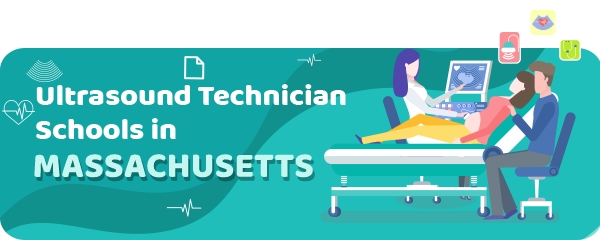Massachusetts is a small state and also one with the highest salaries, and this includes the medical field.
Care-giving and medical facilities are looking for more personnel for their ultrasound investigations.
All this means that now it’s the time to train as a sonographer technician, as even an Associate’s degree will have a good income.
Annual Salary Range:| Location | Avg. Annual Salary |
|---|---|
| Boston | $86,195 |
| Worcester | $80,414 |
| Springfield | $79,803 |
| Cambridge | $86,195 |
| Lowell | $83,240 |
| Brockton | $82,705 |
| New Bedford | $80,491 |
| Lynn | $86,195 |
| Quincy | $86,195 |
| Fall River | $80,491 |
Article Table of Contents
Regional Salary in Massachusetts
| Region | Employed | Avg. Annual Salary | Avg. Hourly Pay | Top 10% Annual Salary | Bottom 10% Annual Salary |
|---|---|---|---|---|---|
| Barnstable Town, MA | 80 | $104,710 | $50.34 | $116,090 | $91,020 |
| Boston-Cambridge-Nashua, MA-NH | 1,660 | $103,570 | $49.79 | $126,080 | $83,060 |
| New Bedford, MA | 60 | $93,640 | $45.02 | $113,900 | $68,480 |
| Springfield, MA-CT | 110 | $88,870 | $42.73 | $99,270 | $77,170 |
| Worcester, MA-CT | 200 | $95,690 | $46.01 | $105,670 | $84,970 |
* Employment conditions in your area may vary.
Becoming Licensed
Holding a license as an ultrasound technician in Massachusetts is not currently mandatory.
Becoming certified or earning a degree in the field are good options as they increase both the chances of getting hired and your salary from the start.
The first step of getting licensed is to enroll in a training program that received accreditation from the Commission on Accreditation of Allied Health.
The training program for a simple certificate lasts for about 1 year.
Those interested in certification can also attempt to take the test organized by the American Registry for Diagnostic Medical Sonography (ARDMS).
These are held at the Pearson Vue testing centers.
If the program was not accredited, the candidate needs to prove:
- 60 semester hours,
- an internship
- 12 months of employment
Earning a Degree
To earn a degree like an Associate’s, candidates have to enroll in a special educational program that also includes practice hours in a clinic setting.
The practice time lasts for about 6 months from the total duration of the program.
Some of the subjects could be:
- Vascular ultrasound,
- Pathophysiology,
- Ultrasound physics.
To earn an Associate’s degree, students need to spend 2 years in school.
Those who want a higher degree, like a Bachelor’s, need to study for 4 years.
The practice time is needed because the technicians use a series of devices and methods and they don’t only need to learn how to manipulate the machines, they also need to learn how to interpret the results.
However, some of the schools offering such programs might require their students to first meet certain criteria.
In some cases, better knowledge concerning the following topics might be needed:
- Medical terminology,
- Anatomy
- Physiology
| School Name | Address |
|---|---|
| Branford Hall Career Institute | 189 Brookdale Dr, Springfield, MA 01104 |
| Bunker Hill Community College | 250 New Rutherford Ave Boston, MA 02129 |
| Cape Cod Community College | 2240 Iyannough Rd, West Barnstable, Massachusetts 02668 |
| Lincoln Technical Institute | 5 Middlesex Ave, Somerville, MA 02145 |
| Massasoit Community College | One Massasoit Boulevard, Brockton, Massachusetts 02302 |
| MCPHS University | 179 Longwood Ave, Boston, MA 02115 |
| Middlesex Community College | Springs Road – Building 6 Bedford, MA 01730 |
| Mildred Elley | 100 West St, Pittsfield, MA 01201, |
| Regis College | 235 Wellesley Street Weston, MA 02493 |
| Salter College | 184 W Boylston St, West Boylston, MA 01583, |
| Springfield Technical Community College | One Armory Square, Suite 1 PO Box 9000 Springfield, MA 01102 |
| The Salter School | 2 Florence St, Malden, MA 02148 |
Specializations
The sonography field has several specializations, and they’re pretty different from the other.
These specializations are:
- MRI – used to take 3D images of organs
- Sonography – used for diagnosing purposes
- Ultrasound – used for many types of investigations
- Radiology – mostly used to analyze the bones
- Vascular sonography – used to have a look at the patients’ blood vessels
- Echocardiography – used to record data about the heart
Additionally, each of these areas may have the technicians specialize in a specific task, such as:
- Obstetrics and gynecology,
- Breast sonography,
- Abdominal sonography,
- Cardiovascular sonography,
- Neurosonography
Those interested in the vascular sonography or breast sonography specializations need to earn a diploma from The American Registry of Radiologic Technologists.
This is possible after working for 2 years in non-invasive cardiovascular sonography and then attempting to earn the diploma through the Cardiovascular Credentialing International.
This credential must be renewed every 2 years after completing 24 continuing education credits.
Read the full guide: How to Become an Ultrasound Technician
